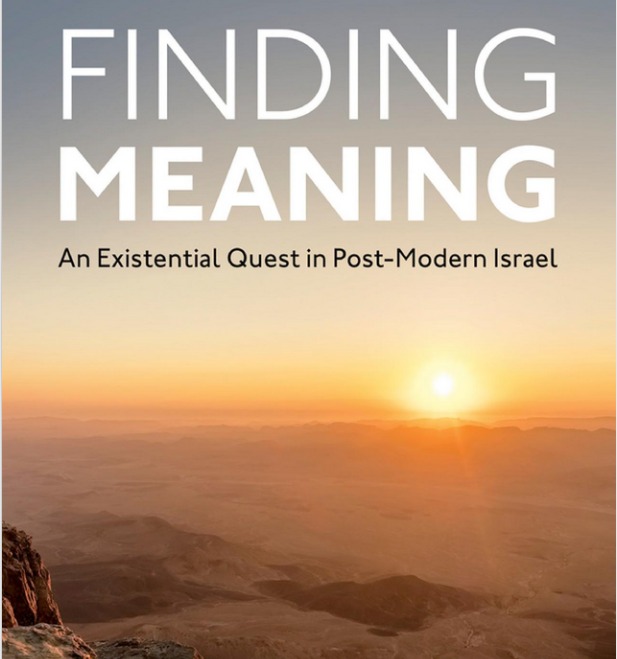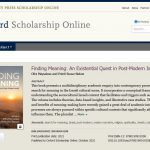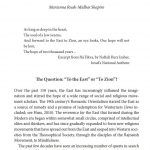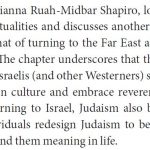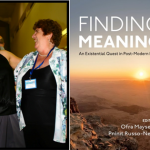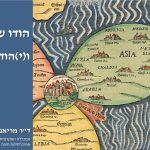The spiritual journeys Israeli-Jews make to the Far East do not merely provide them with experiences and revelations, but also help them reclaim meaning, answer life’s questions, and shape their identity and lifestyle. Surprisingly, some journeys end in embracing Jewish tradition. Why – and how – do secular Israelis, who have never shown any interest in the spiritual matters and aspects of their native tradition, find, following their journey, that Jewish spirituality is relevant to their quest for meaning? This article conducts a critical discussion on the easternization thesis (which claims the West is undergoing a profound paradigmatic transformation), culminating in the conclusion that the East is not Westerners’ and Israelis’ true object of desire, but rather an object upon which they project their Western/Israeli discomfort, passions and images. Judaism, which has been going through an exoticization process within the framework of local New Age – much like the Far East in global spirituality – has been adapting itself to their coveted imagined model.
The article (about 8,500 words) is included in an anthology on the subject of “the search for meaning in the Israeli cultual scene”, published by Oxford University Press, and edited by Ofra Mayseless and Pninit Russo-Netzer.
Within this research project there are more items – such as academic articles in Hebrew and English, a semi-academic column, and more. Links below.
“Every disciple must know, that by visiting the Tzaddik
And the Rabbi, he shall know that treasure may not be found
At the Rabbi’s home alone, and when he goes to his home—he shall search
And excavate as far as his hand extends, and seek and ye shall find
Believe the word is very nigh unto thee, in thy mouth, and in thy heart,
that thou mayest do it [see Deut. 30:14], right there with him.
And you must understand.”
[Rabbi Simcha Bunim of Peshischa, Simchat Yisrael, 25)”
“As long as deep in the heart, The soul of a Jew yearns,
And forward to the East, to Zion, an eye looks,
Our hope will not be lost, The hope of two thousand years…”
(Excerpt from HaTikva, by Naftali Herz Imber,
Israel’s National Anthem)
And the question is: “To the East” or “To Zion”?
Highlights:
1. In the face of the decline of traditional religions, individuals are at their wit’s end: losing meaning and values, having their identities fragmented, and experiencing a deepening sense of alienation.
2. Israeli secular Jews view Judaism as a tradition missing its essential pieces, much like other Western religions. Thus, like their Western counterparts, they pursue the East as part of their quest for meaning, since the Asian context enables a positive outlook on rituals, beliefs, and metaphysics.
3. The West wasn’t going through an Easternization process, as it might seem. Apparently, elements of Asian traditions were selectively chosen and redesigned to fit a Western framework, overlooking some problematic aspects, and thus enabling the perseverance of reverence towards the imagined East.
4. Like the East, Judaism becomes an object onto which Israelis may project their own needs and desires, and a sphere in which they may search for meaning. Judaism becomes their “new Orient”. This is a re-imagined Judaism in the likeness of the Western re-design of Eastern traditions, and of New Age values, using the “exotization of Judaism”.
5. The far-away journey is needed in order to meet the internal needs. The built-in critical character of Westerners/Israeli-Jews is what pushes them toward their imagined Asian Other, in a journey to find answers and relief from their home-based anguish.
In their introductory chapter to the anthology, Ofra Mayseless and Pninit Russo-Netzer describe Marianna Ruah-Midbar Shapiro’s chapter as follows (p.12):
“Chapter 15, by Marianna Ruah- Midbar Shapiro, looks at the same scene
of contemporary spiritualities and discusses another prevalent and significant
phenomenon— that of turning to the Far East and Asian traditions as
a source of meaning. The chapter underscores that this process involves an
imagined East where Israelis (and other Westerners) selectively choose what
they take from Eastern culture and embrace reverence toward this imagined
East. When returning to Israel, Judaism also becomes an object for
projections, and individuals redesign Judaism to be exotic, incorporating
New Age values that lend them meaning in life.”
Academic/Non-academic
Academic item
Bibliographical citation
Ruah-Midbar Shapiro, Marianna, “Judaism is the New Orient – How Experiencing the Far-East Helps Israelis Find Meaning in their Jewish Tradition”, in Mayseless, Ofra and Pninit Russo-Netzer (Editors). The Search for Meaning in the Israeli Cultural Scene. Oxford University Press, 2021. ch. 15; pp. 333-354.

